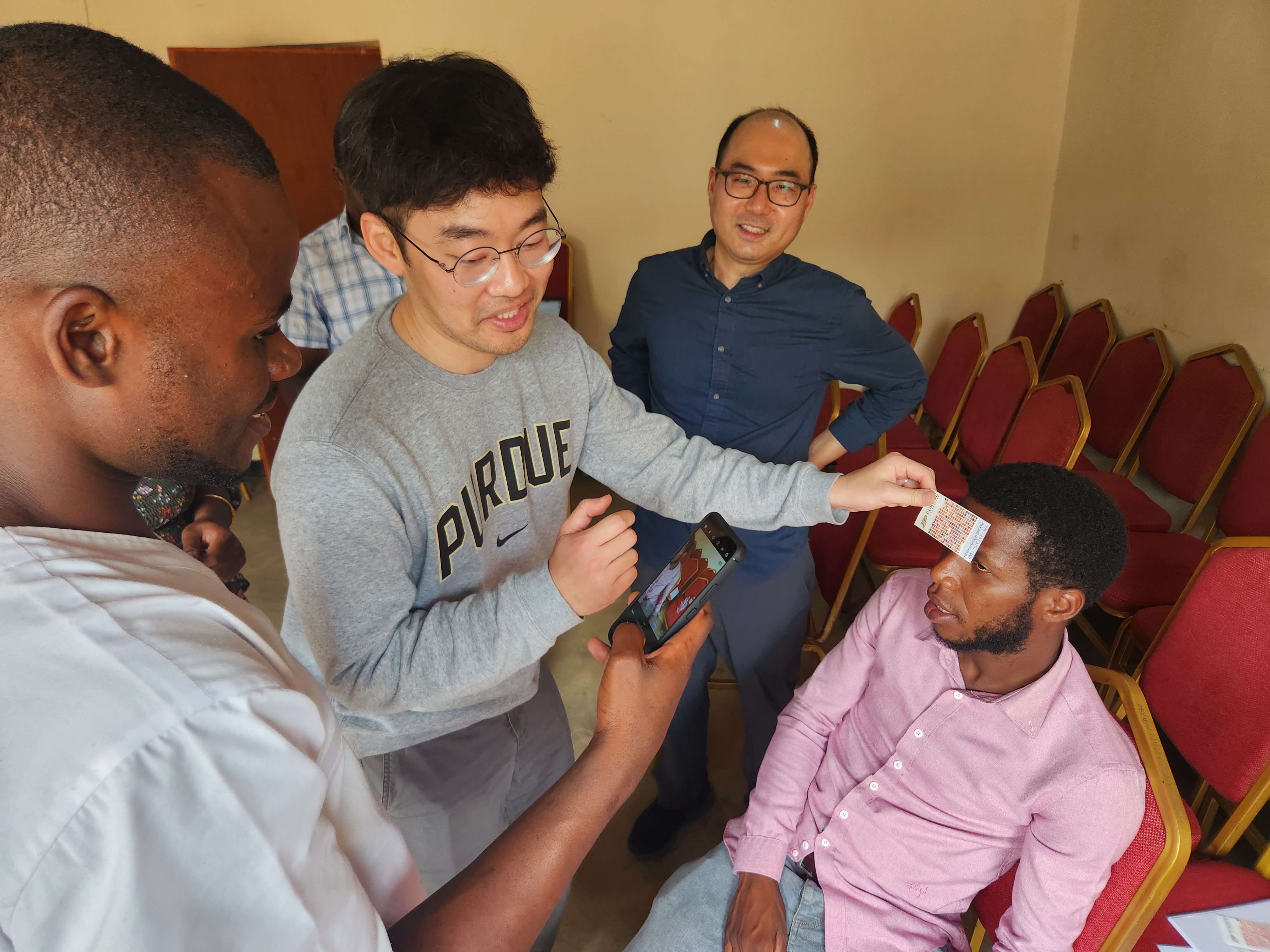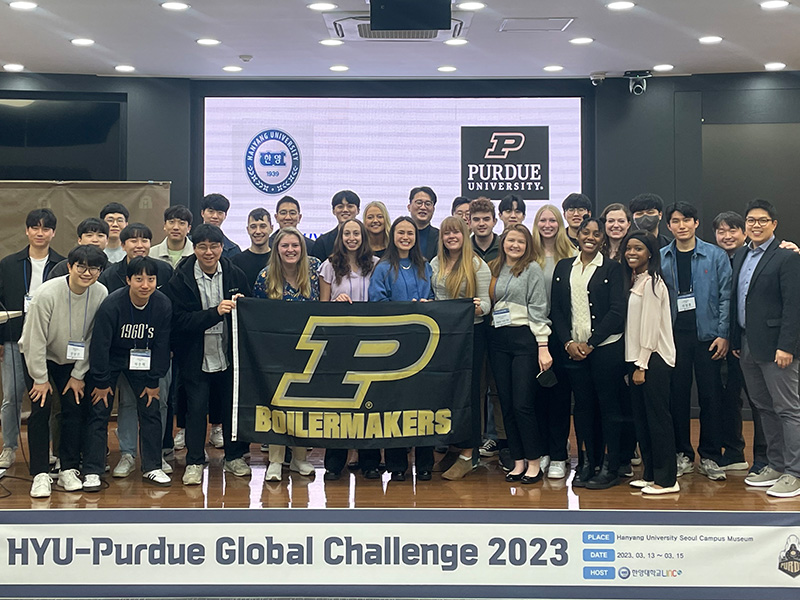Weldon School students, faculty complete study abroad trips to Rwanda, South Korea
These programs are designed to enrich the curriculum by giving students a learning experience outside the classroom and allow them to better understand the world around them. The short-term faculty-led programs are another avenue for students to attain an experience in Purdue University’s acclaimed engineering study abroad program.

Rwanda: Mobile Health (mHealth) technology training for the detection of malaria
According to the World Health Organization (WHO), the African Region carries a disproportionately high share of the global malaria burden. In 2021, the Region was home to 95% of malaria cases and 96% of malaria deaths. Early diagnosis and treatment of malaria reduces disease, prevents deaths, and contributes to reducing transmission. WHO recommends that all suspected cases of malaria be confirmed using parasite-based diagnostic testing.
Purdue BME is no stranger to these facts because in 2020, Dr. Young Kim, associate head for research and professor of biomedical engineering, championed the team that was awarded first prize in a National Institutes of Health (NIH) Technology Accelerator Challenge to design and develop non-invasive, handheld, digital technologies to detect and diagnose anemia, sickle cell disease, and malaria.
School-age school children in sub-Saharan Africa are more commonly infected with malaria parasites among other age groups, but their infections are often undiagnosed because of a lack of malarial testing commodities. That’s what charged Dr. Kim to lead a group of three Purdue BME students on a trip to Rwanda to develop mobile health (mHealth) technology to reliably identify school-age children who will need malaria tests and potentially receive treatment. This study is sponsored by NIH Fogarty International Center.
Dr. Kim and his students first visited Gakoma Hospital in the Gisagara District in Southern Province, Rwanda to train nurses and community health workers on the new detection technology. In coordination with the Ministry of Health, they selected this hospital because the Gisagara District has the highest malaria incidence of 534 per 1,000 persons in Rwanda in FY 20-21. The group also visited the Regional Centre of Excellence in Biomedical Engineering and eHealth at the University of Rwanda to create connections with students and faculty.
Priya Sakthivel (BSBME ’22), clinical research coordinator for Dr. Kim at the Weldon School, said the most impactful moment of the trip was visiting Gakoma Hospital and viewing a graph showing the rise and fall of malaria prevalence in Rwanda over the years.
“Various factors influenced the slopes on this graph: rainy seasons, standing water in rice plantations, community health workers reducing time to seek care, distributing mosquito sprays, rapid diagnostic tests, vaccines, an import of medication... the list goes on,” said Sakthivel. “A decline in malaria prevalence is a result of the work of thousands that developed a combination of data-driven community, technological, and medical solutions. This emphasized the importance of considering health determinants beyond medical care when designing solutions. Rwanda is a testament to the progress that can be made through designing and enforcing evidence-based public health programs through policy.”
Sakthivel reflected on her overall experience and said visiting Rwanda encourages her to explore the data and technology we have at our disposal and ask questions.
“What problems can this technology solve? Which populations need this solution? What information can I draw from this data? As a biomedical engineer, I have the capability to, in small part, contribute my skills to identify and address health needs. It motivates me to continue developing my knowledge and skills and to stay involved and attentive to the community,” said Sakthivel.

South Korea: Gaining global perspective from Biotech to KPOP
South Korea is a country known for its strong economy, ranking 10th in the world. It's also famous for being a leader in digital technology, with top-notch internet and communication infrastructure. This success is driven by a highly educated workforce that values innovation, with a high percentage of young adults graduating from college.
In fact, South Korea is considered the most innovative country in Asia, and is renowned for its exports of popular consumer electronics like LG and Samsung, as well as automobiles like Hyundai and Kia. But did you know that their biotech industry is also booming? They are investing trillions of dollars in biopharmaceuticals and medical devices, making significant strides in this field.
What's more, South Korea has been lauded for its effective management of the COVID-19 pandemic, earning recognition for its expertise in handling infectious diseases. This has further solidified its reputation as a global leader in this area.
Dr. Hyowon (Hugh) Lee, associate professor of biomedical engineering, and Dr. Chi Hwan Lee, Leslie A. Geddes associate professor of biomedical engineering, led 12 engineering students on a week-long trip to Seoul, Korea to learn more about their futuristic culture. They partnered with Hanyang University, one of the leading Korean universities, and got to experience Korean food, snacks, historic sites, and even toured the famous K-POP industry.
The students also learned about the exciting developments in South Korea's biotech industry and explored potential collaborations for the future. This unique experience gave them valuable insights into South Korea's innovative culture and its growing biotech sector, opening up new opportunities for their academic and professional endeavors.
“Going into the trip I had little knowledge about South Korea or even Asia as a whole, but by time I left I had an entire new understanding of the culture,” said Purdue BME senior Kyndall Davis. “I have a lot of favorite moments from the experience, but one that stands out was doing karaoke with students from Hanyang University.”
Maya Alborn, Purdue BME senior, ranked this trip as a highlight of her time as a Purdue student. “Going to Seoul is an experience that I will remember for the rest of my life. It was so exciting to see a new and beautiful culture, meet other engineering students, and eat delicious food – lots of kimchi! I learned so much about their wonderful culture that they are so proud of.”
Chloe Rouse, Purdue BME junior, echoed Maya’s sentiment about her experience. “During my time in Seoul, I was able to develop a deeper understanding and respect for Korean culture and connect with several engineering students at Hanyang University. The experiences that I had on this trip were transformative and have made a significant and positive impact on my life.”
